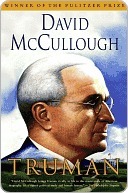More on this book
Community
Kindle Notes & Highlights
man of exceptional inner calm and strength.
Visitors find him undaunted and sure that, whether in his time or thereafter, a way will be discovered to preserve the world from the destruction which to many seems unavoidable. . . .
When we forget the examples of such men as Washington, Jefferson, and Andrew Jackson, all of whom could have had a continuation in the office, then we will start down the road to dictatorship and ruin.
According to Margaret, her father returned from the phone in a state of extreme agitation, having already concluded the worst. “My father,” she wrote, “made it clear, from the moment he heard the news, that he feared this was the opening of World War III.” It was to be a long night for the family.
There was nothing passive about Harry Truman. He was the commander in chief in law and in fact.
The “job” was long and difficult. It meant increased taxes, rationing if necessary, “stern days ahead.”
“He would have saved himself a lot of grief had he relieved both men at the onset of the war,” was the subsequent view of General Bradley.
As things looked late the morning of Sunday, October 15, 1950, on Wake Island, MacArthur would be winding up the war almost any day.
One of the saddest things of all, Truman told a friend, was the way McCarthyism seemed to have an effect.
When a general complained about the morale of his troops, observed George Marshall, the time had come for the general to look to his own morale.
The Joint Chiefs, too, told Truman that mass destruction of Chinese cities with nuclear weapons was the only way to affect the situation in Korea. But that choice was never seriously considered.
while doing all he could to avoid a wider war, he was clearly preparing for one. As General Marshall later attested, “We were at our lowest point.”
“While General MacArthur was fighting the Pentagon, General Ridgway was fighting the enemy.”
Meanwhile, Truman could withstand the bombardment, for in the long run, he knew, he would be judged to have made the right decision.
there could be no easy or decisive victory in Korea short of another world war.
he was still the Truman of old, hardworking, cheerful, never short with them, never petty.
“We will not buy an armistice by turning over human beings for slaughter or slavery,” Truman declared, and he would not be budged.
To Truman, Churchill was the greatest public figure of the age, as he often said. To Dean Acheson, this was an understatement. One would have to go back four centuries to find his equal, Acheson insisted.
he would have been either a farmer, an historian, or an architect.
After an absence of three years, four months, the President of the United States was again in residence at the White House.
There was no script and Truman was at his best, relaxed, gracious, amusing, and knowledgeable.
Stevenson was impressed with this self-contained, internally secure man that Truman was
To Truman, with his devotion to George Marshall, Eisenhower had committed an act of unpardonable betrayal. Truman tried to contain his fury.
He felt much as he had when he was heading home from France after World War I, not knowing what the future held in store for him,
The President’s physical and mental “resilience,” wrote Brown, was incredible. In fact, Truman, at sixty-eight, was leaving office in better health than when he came in
What he said was that the greatest part of a President’s responsibilities was making decisions. A President had to decide. “That’s his job.”
He refused to be idle.
On March 5, in Moscow, after nearly three decades in power, Joseph Stalin had died of a cerebral hemorrhage at age seventy-three. Ten days later, Stalin’s successor, Georgi M. Malenkov, declared in a speech that there was no issue between Moscow and Washington that could not be resolved by peaceful means. Two weeks after Malenkov’s speech, the Communists in Korea suddenly agreed to an exchange of wounded prisoners
The government in Washington was to contribute nothing to the cost of creating the library. He would raise all the money himself.
In my long life I have never met an individual with whom I felt so instantly at home. He talked as if he had always known me, openly, easily, with no reserve (so far as I could judge).
He was there in total six and a half days a week for nine years, longer than his two terms in the White House.
“I was now, in effect, his man,” Benton wrote, “and he was going to protect me. And he did.”
With the passing of time, old political wounds began to fade. Truman made amends, restored friendship with one former adversary or critic after another—Henry
Only three remained for whom he had little or nothing good to say: Eisenhower, MacArthur, and Richard Nixon. The man he had hated most, Joe McCarthy, was dead, of acute alcoholism at age forty-eight in 1957.
There was an unfortunate preoccupation at the Kennedy White House with “image,” Acheson wrote to Truman. This is a terrible weakness. It makes one look at oneself instead of at the problem. How will I look fielding this hot line drive to short stop? This is a good way to miss the ball altogether.
He held to the old guidelines: work hard, do your best, speak the truth, assume no airs, trust in God, have no fear.
ten years of work on this book,


